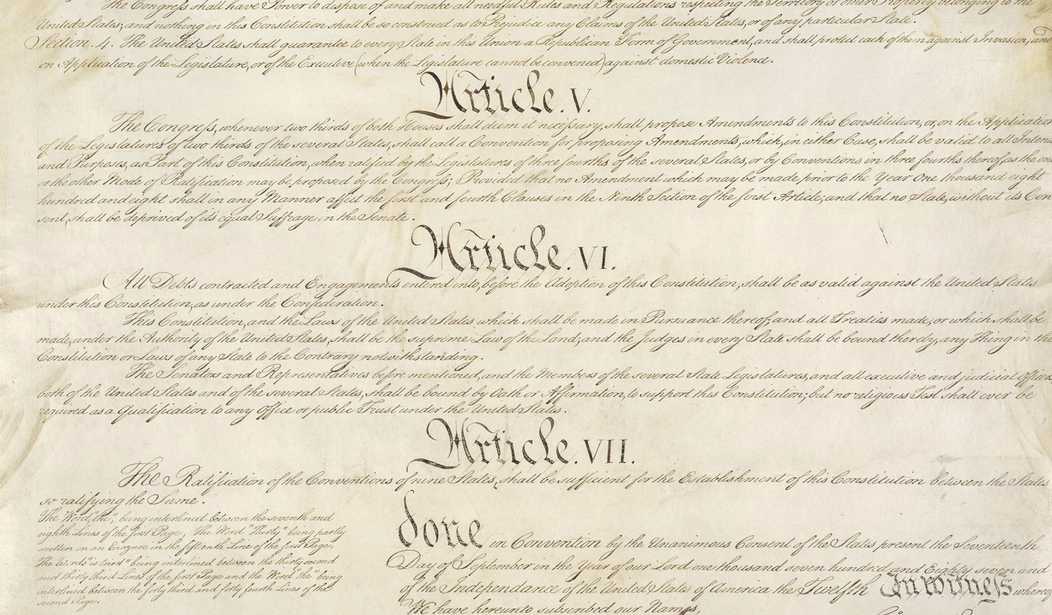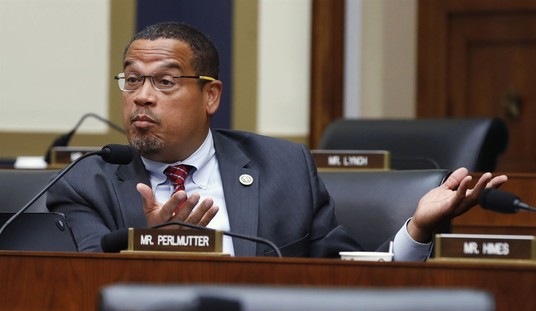In almost every election year, most especially after the election results are known, there is a lot of talk about reforming the election process. The left almost universally wants to do away with the electoral-vote method of electing presidents and instead adopt a national vote, which, despite the regular use of the term, does not at present exist. The right tends to favor term limits, although that favoring is far from universal.
What we don't hear as much about is the election of senators. The Senate was intended by the Founders to be a kind of sea-anchor on the legislative branch, a more deliberative body where the passions of the House of Representatives would be tempered. That, in part, was why the Senate was originally intended not to represent the voters directly, but the state legislatures - the governments of the various states. This is federalism. This is how a constitutional republic - not a democracy - works.
In 1913, the United States completed ratification of the 17th Amendment to the United States Constitution, mandating the direct election of Senators. That amendment reads:
The Senate of the United States shall be composed of two Senators from each State, elected by the people thereof, for six years; and each Senator shall have one vote. The electors in each State shall have the qualifications requisite for electors of the most numerous branch of the State legislatures.
When vacancies happen in the representation of any State in the Senate, the executive authority of such State shall issue writs of election to fill such vacancies: Provided, That the legislature of any State may empower the executive thereof to make temporary appointments until the people fill the vacancies by election as the legislature may direct.
This amendment shall not be so construed as to affect the election or term of any Senator chosen before it becomes valid as part of the Constitution.
Section 3 of the Constitution describes the original process of appointing Senators:
The Senate of the United States shall be composed of two Senators from each State, chosen by the Legislature thereof, for six Years; and each Senator shall have one Vote.
There's a good argument to be made for repealing the 17th Amendment. The New Guard Press's Ayaan Karan has some interesting points to make.
For over a century, the Senate operated within the “Madisonian Balance,” its members elected via state legislatures to create distance from public opinion and act as a guardrail against majoritarian impulses. This changed in 1913 with the 17th Amendment, which established the direct election of Senators by the state’s population. Largely led by the Progressive-era populist movement, the 17th Amendment was championed by progressives as an egalitarian reform of a corrupt oligarchy. In reality, the Senate’s historic place in the “Madisonian Balance” of American institutions was stripped of its intended aristocratic guardrail.
Rarely does anything good come from chipping away at the republic in the name of "democracy," and this was one of the nation's more unfortunate decisions. It denied the Founder's original intent for the Senate and made it just another group of Santa Clauses, promising the voters ever more free Schiff to buy votes. Now we see the cost:
The result is a Senate that mirrors the House, driven by short-term incentives, performative behavior, and a sacrifice of the common good for the sake of majoritarianism. Without the prudent instincts of the Senate, the balance of power predictably moves toward the majoritarian bodies. Senators are now selected for popularity and partisan appeal, bound to an electoral cycle that rewards expediency over principle.
Now, there's no guarantee that Senators appointed by state legislatures would be vastly better. California's legislature would very likely send to Washington a couple of real partisan, woke, "progressive" nutcases. But how is that any different than who the California voters are sending to Washington? But many states, we would hope, would have legislatures that are a tad more responsible.
The political climate ushered in by the 17th Amendment reflects a philosophy antithetical to the delicate “Madisonian Balance” of the Founders; we are led by a mythologized view of popular sovereignty, an obsession with what “the people” want. As a result, the U.S. has moved toward the logical extreme of institutional decay, as populists from the Left and Right have fashioned themselves as anti-institutionalists and representatives of “the people.”
What would the Senate look like today if the 17th Amendment had not been ratified? It's not a certainty, but a look at the makeup of the 50 state legislatures would, at this moment, likely give the GOP a comfortable majority. In the state legislatures, the GOP holds a distinct majority:
As of June 30th, 2025, Republicans controlled 55.59% of all state legislative seats nationally, while Democrats held 43.73%. Republicans held a majority in 57 chambers, and Democrats held the majority in 39 chambers. Two chambers (Alaska House and Alaska Senate) were organized under multipartisan, power-sharing coalitions. One chamber (Minnesota House of Representatives) was split evenly between both parties.
But that's not the reason for repealing the 17th. This is a matter of principle; it's a matter of recognizing the intent of the Founders, and it's a matter of moving us away from direct democracy and back to what the United States was meant to be - "A republic, if we can keep it."
Montana's legislature is already considering a resolution calling for repeal of the 17th, but that's largely symbolic.
See Also: New: GOP Senator Thom Tillis Won't Seek Reelection in 2026
Trump Sheds No Tears Over Thom Tillis' Retirement, Issues Warning for Other Would-Be Defectors
And, finally, for the people who would oppose this yapping about "our democracy." It bugs me when people who should know better refer to “our democracy.” The United States is not and never was a democracy. We are a constitutional republic, and the Founders built into the Constitution specific safeguards to prevent the nation from falling into direct democracy. The appointment of Senators by the legislatures of the several states was a key in said prevention.
At present, senators are just representatives with longer terms in office. At present, the government of Zimbabwe has direct representation in the Imperial City (through an embassy), but the government of Wyoming does not.
Here's the thing: Much as I’d like to see the 17th repealed (and several others into the bargain), I’ve resigned myself to the idea that I’ll never see it happen. It is in the nature of government to grow ever larger and more intrusive; the 17th Amendment is a symptom of that, not a cause. The Founders did a pretty decent job of constraining the federal government, but those chains slip ever further now, day by day, while much of the citizenry welcomes the ever-increasing gravy train. There's a good argument, yes, to be made for repealing the 17th Amendment - but the question is, who is listening?
It’s a sad state of affairs.















